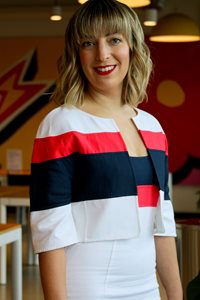Member Spotlight: Judith del Cuadro-Zimmerman Strikes Out on Her Own
January 15, 2021
If the New Year is for fresh starts, Judith del Cuadro-Zimmerman is right on track. The Brooklyn-born attorney spent the last part of 2020 in launch mode for her small firm practice, del Cuadro-Zimmerman, PLLC, which is officially open for business in Washington, D.C.
 “It’s exciting to me on a personal level. I haven’t felt this invigorated in a while,” she says. “There’s an element of freshness that can be good for a lawyer.”
“It’s exciting to me on a personal level. I haven’t felt this invigorated in a while,” she says. “There’s an element of freshness that can be good for a lawyer.”
This isn’t her first go-round as an entrepreneur. In 2014 she cofounded del Cuadro-Zimmerman & Mount, PLLC, where she practiced family law. But this time she’s leading the charge and is grateful for a second staff attorney and case manager to grow with.
“It’s hard to find people who want to do the work and who have the same passion as I do. We’re dealing with people in poverty, in difficult situations. It takes a very specific skill set,” del Cuadro-Zimmerman says. Her firm’s service areas include premarital agreements, adoption, separation and divorce, child custody, child abuse and neglect, and wills and estates planning.
Seeking the Right Resources
Starting a business is no walk in the park, and del Cuadro-Zimmerman says the D.C. Bar’s Practice Management Advisory Service (PMAS) gave her the step up she needed. For attorneys interested in hanging out their shingle, the PMAS offers free courses and trainings on starting and running a small firm in the District of Columbia. Del Cuadro-Zimmerman took advantage of the two-day Basic Training & Beyond program dedicated to teaching attorneys how to set up a small firm and handle client relations, productivity, technology, and marketing.
“They don’t offer business classes in law school. Dan Mills [advisor] is a great resource. I shoot him emails and ask him questions. He knows everyone,” del Cuadro-Zimmerman says. “Six years later, I have a lot more facility with running a business. Law school doesn’t prepare you for that.”
Being resourceful and pushing through the fear of failure were key, too. Told she was too young to start a firm in her 20s, del Cuadro-Zimmerman held on to her dreams and made necessary personal sacrifices to give her firm time to turn a profit. At the time, she was living in a group house with six roommates who would turn out to be great resources for her.
Looking back, she advises other attorneys to make the leap as fearlessly as possible, and to be okay with making mistakes but to learn from them. “Starting a firm will feel like you’re trying to rediscover fire. You have no idea what you’re doing,” she says.
Finding Joy in Helping Others
When del Cuadro-Zimmerman started out, she recalls drafting seven-page-long retainer agreements. “I realized that my clients didn’t understand them. I scrapped it because it just wasn’t practical.”
She thrived by tapping into her network, including members of the D.C. Bar, contacts from law school, family, and friends. “As soon as you’re off on your own, you have no idea how the infrastructure is put in place. You can’t be afraid to ask questions.”
Before cofounding her first firm, del Cuadro-Zimmerman spent years learning the ropes at family law firms in the District of Columbia and Maryland where she handled custody, divorce, and estate planning matters. In law school she served on the board of the Lambda Law Society organizing educational programs and outreach around LGBTQ legal issues. She was also recognized for her advocacy for people in poverty by being awarded an Equal Justice America fellowship and a Bingham McCutchen fellowship for her work at the Lawyers’ Committee for Civil Rights Under Law.
Today, she is part of the D.C. Superior Court’s child abuse and neglect guardian ad litem panel, representing children in foster care, those residing in unstable homes, or those caught in fraught custody battles. “My primary focus was neglect when I started out. But in law school, I was interested in civil rights,” she says. “The other practice areas evolved from civil rights. Most people would be surprised by how much the areas overlap.”
Del Cuadro-Zimmerman finds joy in helping her clients resolve difficult situations. When her elderly clients need assistance making end-of-life decisions, she helps articulate what they want. “I’m very certain of the course of action that needs to be taken. A lot of my neglect clients can’t advocate for themselves. Being able to navigate that for them and with them is the best part of my work.”
It can be emotionally heavy work, but del Cuadro-Zimmerman stays centered through another kind of practice: Ashtanga yoga. She’s practiced for 10 years and starts each day with a session.
“I’m a big proponent of having a discipline to create balance in my life. Yoga is very reflective of what you need for the rest of your day. It’s very linear and structured. The progress you see only happens if you do it every day. Handstands were the skill set I wanted to develop. The amount of progress I’ve made is unbelievable. Law practice is that way, too. You have to show up every day to see your skill set grow.”





